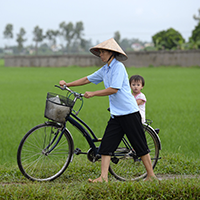

In an effort to support family farmers and foster inclusive and resilient development towards achieving the Sustainable Development Goals, the Global Forum on Agricultural Research and Innovation (GFAR) and the World Rural Forum (WRF) proudly announce the launch of the Community of Practice (CoP) of the Collective Action on Participatory Research in Family Farming.
The initiative is set to create a collaborative learning space for dialogue, knowledge sharing and innovation, empowering family farmers and researchers alike in the pursuit of sustainable and healthy food systems through participatory research. As stated on the vision of the CoP itself, it seeks "to ensure that participatory research with/for/by family farmers and their organizations is widely extended and applied, generating political, technical, economic, social and ecological impact on the livelihoods of family farmers for the benefit of society as a whole”. The landmark project falls within the scope of the United Nations Decade for Family Farming 2019-2028 (UNDFF), striving to address global challenges while promoting the role of family farmers in providing sufficient and nutritious food.
Participatory Research, a key component of the UNDFF, emphasizes continuous collaboration between researchers and family farming organizations to build mutual knowledge, co-construct innovative solutions and adapt them to local contexts and needs. By actively involving family farmers in the research cycle, this approach fosters the development of contextualized adaptation and mitigation strategies, especially in the face of multiple crises related to climate change, agrodiversity loss and natural resource degradation.
The launch of the Community of Practice on Participatory Research represents the culmination of the participatory and inclusive process that GFAR and the World Rural Forum began in 2022. Family farming organizations representing different regions united to propel this transformative initiative forward through a Collective Action. Among the organizations participating are: Plateforme Régionale des Organisations Paysannes d'Afrique Centrale (PROPAC) for Central Africa, Pacific Island Farmers Organisation Network (PIFON) for the Pacific Islands, Eastern and Southern Africa Small Scale Farmers' Forum (ESAFF), Programa de Diálogo Regional Rural (PDRR) for Central America, Confederación de Organizaciones de Productores Familiares del MERCOSUR (COPROFAM) for South America, and Asian Farmers Association (AFA).
Various discussions and exchanges have provided the ground to consider the mutual interest and benefits of expanding the capacities, knowledge and mutual understanding of both family farmers and agricultural research actors, and to foster continued knowledge sharing. In view of the progress achieved during these discussions, the participating organizations created a proposal for a Community of Practice on Participatory Research.
The CoP is "a group of individuals or organizations who share a common concern or interest in promoting participatory research and co-innovation within family farming and who assemble to meet both individual and group objectives". The CoP on Participatory Research seeks to create an enabling environment for family farming by promoting farmer-led research, sharing good practices and building new knowledge through continuous interaction. It is based on the nine guiding principles for Participatory Research in Family Farming conveyed by the GFAR, and agreed upon by the members of the Collective Action.
The CoP will embark on several action lines during 2023, including knowledge generation, farmer-led research valorization, advocacy, dialogue promotion, political engagement, partnership expansion, and fundraising. Family farming organizations, members of the Collective Action, presented concrete examples of collaborative processes at the online Global Session last October 4th, 2023. The Session gathered relevant actors coming from diverse constituencies, including family farming organizations, innovation and research actors, international organizations, among others, and reflected on the principles and actions that can help ensure successful Participatory Research processes to address challenges faced by family farmers. Speakers highlighted that a collaborative research process requires establishing an open partnership where hierarchy is removed and every actor involved is at the same level, with the same rights for decision-making and contributing equally to research in order to define the process and achieve positive results. Challenges can only be faced by co-constructing solutions based on knowledge- and real experience-exchanges, establishing a dynamic partnership and a strong collaboration among all actors, tackling specific subjects from a local vision. Participatory research leads to higher capacity for local and regional articulation, improved resource allocation, broader scalability, and reinforced advocacy actions.
Through these concerted efforts, the Community of Practice on Participatory Research in Family Farming aspires to transform agriculture and food systems for a sustainable future. GFAR and WRF will continue their efforts in order to maximize the collaboration among stakeholders, ensured the empowerment of family farmers, the valorization of its local knowledge and their engagement in research processes and activities.
Access the CoP document here.
